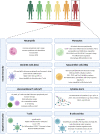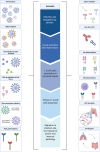Hallmarks of Severe COVID-19 Pathogenesis: A Pas de Deux Between Viral and Host Factors
- PMID: 35757770
- PMCID: PMC9231592
- DOI: 10.3389/fimmu.2022.912336
Hallmarks of Severe COVID-19 Pathogenesis: A Pas de Deux Between Viral and Host Factors
Abstract
Two years into Coronavirus Disease 2019 (COVID-19) pandemic, a comprehensive characterization of the pathogenesis of severe and critical forms of COVID-19 is still missing. While a deep dysregulation of both the magnitude and functionality of innate and adaptive immune responses have been described in severe COVID-19, the mechanisms underlying such dysregulations are still a matter of scientific debate, in turn hampering the identification of new therapies and of subgroups of patients that would most benefit from individual clinical interventions. Here we review the current understanding of viral and host factors that contribute to immune dysregulation associated with COVID-19 severity in the attempt to unfold and broaden the comprehension of COVID-19 pathogenesis and to define correlates of protection to further inform strategies of targeted therapeutic interventions.
Keywords: COVID-19; SARS-CoV-2; biomarker; gut-lung axis; immune dysregulation; immunity; microbiota; severity.
Copyright © 2022 Rovito, Augello, Ben-Haim, Bono, d’Arminio Monforte and Marchetti.
Conflict of interest statement
The authors declare that the research was conducted in the absence of any commercial or financial relationships that could be construed as a potential conflict of interest.
Figures


Similar articles
-
Innate and adaptive immunity to SARS-CoV-2 and predisposing factors.Front Immunol. 2023 May 9;14:1159326. doi: 10.3389/fimmu.2023.1159326. eCollection 2023. Front Immunol. 2023. PMID: 37228604 Free PMC article. Review.
-
The relationship between gut microbiota and COVID-19 progression: new insights into immunopathogenesis and treatment.Front Immunol. 2023 May 2;14:1180336. doi: 10.3389/fimmu.2023.1180336. eCollection 2023. Front Immunol. 2023. PMID: 37205106 Free PMC article. Review.
-
[Adaptive immunity against SARS-CoV-2].Med Sci (Paris). 2020 Oct;36(10):908-913. doi: 10.1051/medsci/2020168. Epub 2020 Sep 22. Med Sci (Paris). 2020. PMID: 32960167 Review. French.
-
Fighting the SARS-CoV-2 pandemic requires a global approach to understanding the heterogeneity of vaccine responses.Nat Immunol. 2022 Mar;23(3):360-370. doi: 10.1038/s41590-022-01130-4. Epub 2022 Feb 24. Nat Immunol. 2022. PMID: 35210622 Review.
-
Hallmarks of immune response in COVID-19: Exploring dysregulation and exhaustion.Semin Immunol. 2021 Jun;55:101508. doi: 10.1016/j.smim.2021.101508. Epub 2021 Oct 26. Semin Immunol. 2021. PMID: 34728121 Free PMC article. Review.
Cited by
-
Adaptive immunity to SARS-CoV-2 infection: A systematic review.Front Immunol. 2022 Oct 10;13:1001198. doi: 10.3389/fimmu.2022.1001198. eCollection 2022. Front Immunol. 2022. PMID: 36300105 Free PMC article.
-
SARS-CoV-2 Monitoring in Wastewater Reveals Novel Variants and Biomarkers of Infection.Viruses. 2022 Sep 13;14(9):2032. doi: 10.3390/v14092032. Viruses. 2022. PMID: 36146835 Free PMC article.
-
Association between SARS-CoV-2 RNAemia, skewed T cell responses, inflammation, and severity in hospitalized COVID-19 people living with HIV.iScience. 2023 Dec 7;27(1):108673. doi: 10.1016/j.isci.2023.108673. eCollection 2024 Jan 19. iScience. 2023. PMID: 38188525 Free PMC article.
-
Persistent and transient olfactory deficits in COVID-19 are associated to inflammation and zinc homeostasis.Front Immunol. 2023 Jul 14;14:1148595. doi: 10.3389/fimmu.2023.1148595. eCollection 2023. Front Immunol. 2023. PMID: 37520523 Free PMC article.
-
A generalizable and easy-to-use COVID-19 stratification model for the next pandemic via immune-phenotyping and machine learning.Front Immunol. 2024 Mar 27;15:1372539. doi: 10.3389/fimmu.2024.1372539. eCollection 2024. Front Immunol. 2024. PMID: 38601145 Free PMC article.
References
Publication types
MeSH terms
LinkOut - more resources
Full Text Sources
Medical
Miscellaneous

